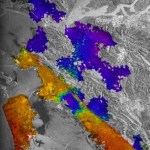speed of sound
Earthquakes are once again in the news, this time in Mexico. Although it is only the biggest quakes that make international headlines, we might take a minute to contemplate other quakes - the ones you'll never feel. So-called "slow" or "silent" earthquakes slip so softly they don't even show up on regular seismographic equipment.
As the name implies, slow quakes release the energy built up along the fault over hours or even days, as opposed to mere seconds for a fast, shaking quake. So why should we care about what happens in earthquakes that even scientists have barely noticed? For one…
I saw this video on digg or reddit. I can't remember which.
I was in awe. Then I started thinking. I wonder how fast that water was moving up right after the explosion. Too bad the video doesn't have a scale. Well, it kind of does - there is that ship. I am terrible at ship identification though. Maybe I can use my favorite scaling trick - assume the stuff is on the surface of the Earth. This means that free falling objects would have an acceleration of -9.8 m/s2. Let me try this on the water as it falls. Oh, trust me. I know it is not really free falling, but it is in this big…
Ok - I like Alabama football (sorry, but it's true). There is a clip on youtube of the end of the Alabama-Auburn game where the fans sing the traditional "Rammer Jammer". If you don't know what that is, don't worry. I am not sure I completely approve of the cheer, but it is a tradition. If you are curious, here it is:
So, what is cool about this? Notice that the entire crowd is yelling the same thing, but they are out of sync. Can this be used to estimate the size of the stadium?
I made an audio file from that youtube clip and looked at it with Audacity. Although I am completely…
